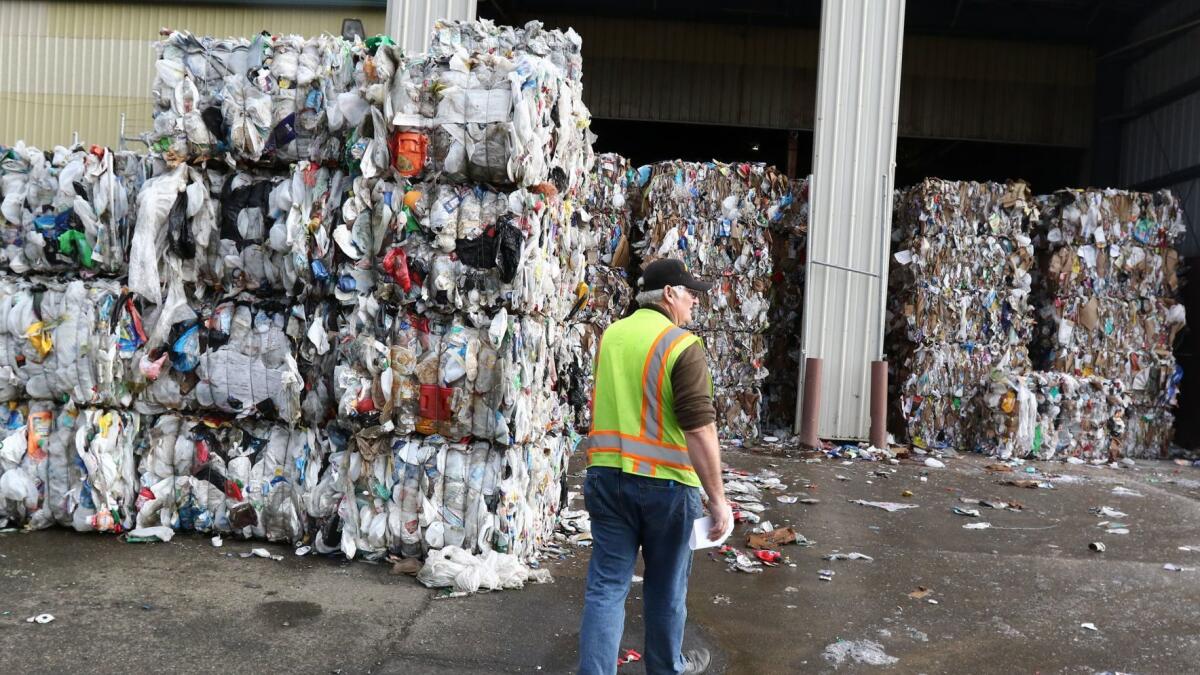Editorial: California has a recycling crisis. The only way to solve it is to stop making so much trash

- Share via
Californians use — and then toss — a tremendous amount of paper and plastic packaging material every day: takeout coffee cups and lids, cereal boxes, wine bottles, plastic bags, clamshell food containers, and on and on.
It’s hard for even the most militant environmentalist to avoid contributing to this waste stream, given the inescapability of products wrapped in some sort of disposable material. Even fruits and vegetables that are naturally encased in durable, compostable wrapping will be trundled up in plastic bags in the produce aisle for the trip home.
Those disturbed by the amount of trash they produce have been able to assuage their guilty consciences by making sure every potential recyclable item ended up in the blue recycling bin. Surely there could be no long-term environmental toll if every empty plastic soda bottle and chipboard six-pack carrier was diverted from the landfill and remade into a cozy fleece jacket or an organic chemistry textbook.
What a lovely story. Too bad it’s about as true as a happily-ever-after fairy tale. Recycling has never been the solution to the problem posed by empty beer cans, plastic takeout containers and other single-use items, just a way to mitigate the effects enough to pretend that all this waste is not really wasteful. But reality is becoming harder to ignore now that the foreign market for our trash is collapsing. Hallelujah to that, as it might just be the impetus needed to force society to confront the disposable culture that is trashing the planet.
The real solution — the long-term solution — is not to improve our recycling process, but to reduce our reliance on disposable items.
And we owe it all to China. Up until just a few weeks ago, China was the single largest market for the world’s recyclables. About two-thirds of the yogurt cups, soda bottles and magazines tucked into curbside recycling bins and crushed into bales were loaded onto cargo ships bound for China and other countries, where they were remanufactured into shiny new products and shipped back to the U.S. But China has its own refuse to worry about, and officials there announced last year that they no longer wanted to import the world’s trash, especially the plastic kind. Then in May, China temporarily shut down all imports of recyclable material and warned that it would impose tough, permanent restrictions by the end of the year. The U.S. and other nations are still scrambling to figure out what to do with the rapidly growing trash bottleneck.
While Vietnam, Indonesia and some other countries still buy recyclable materials, there’s no market on the scale of China. Meanwhile, bales of mixed paper (cereal boxes, junk mail and the like) and plastics are piling up in warehouses up and down the state. If a buyer can’t be found soon, the bales will probably have to be taken to landfills to make room for the next wave of paper and plastic because the U.S. doesn’t have the remanufacturing facilities to process it here.
It’s a crisis, certainly. But it’s also an opportunity to enact meaningful, and necessary, policies that would otherwise face too much public resistance. Even before this development, California’s recycling rate (that is, the percentage of recyclable material that didn’t get tossed in landfills) was on the wane, down from a high of 50% in 2014 to 44% in 2016.
Trash haulers and other waste management officials in California are starting the conversation on stop-gap measures such as educating consumers to do a better job recycling. They are talking about longer-term approaches as well, such as building plants in the state to use recycled materials and putting pressure on manufacturers to share responsibility for the cost of the waste their products become.
But while these proposals are worthy of discussion, they are simply not sufficient to solve the problem. The real solution — the long-term solution — is not to improve our recycling process, but to reduce our reliance on disposable items.
Earlier this year, we urged the state’s leaders to start working on comprehensive plans to reduce the use of plastic (which is found in many disposable items and doesn’t biodegrade — all of the plastic ever made still exists in the environment somewhere, usually broken into tiny bits). Sadly, there has yet to be any real action on this front. Even fairly minor proposals to cut plastic waste, such as by requiring the lids of disposable plastic beverage bottles to be tethered on and by barring restaurants from handing out plastic straws unless a customer asks for one, have generated fierce backlash.
With the recycling market breaking down and trash piling up, there’s no more time to waste. Policymakers and consumers should step up and take the hard but necessary steps to deal with our out-of-control trash-generating culture.
Follow the Opinion section on Twitter @latimesopinion and Facebook
More to Read
A cure for the common opinion
Get thought-provoking perspectives with our weekly newsletter.
You may occasionally receive promotional content from the Los Angeles Times.









